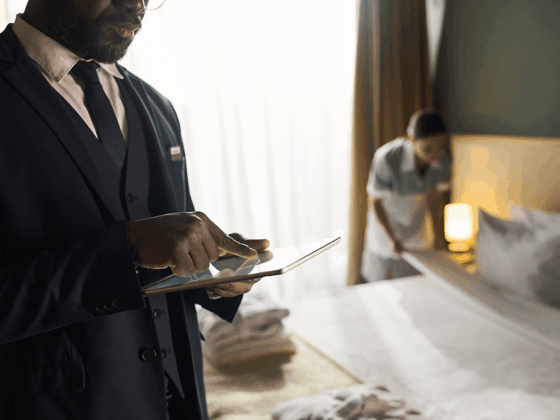Josiah: I’m trying to help our listeners understand what the path to the C-suite might look like. My question for you is, in what ways do you feel your earlier experiences, including in revenue management and commercial services, prepared you for your leadership role today? I’m very curious how you think about that through line or how those dots are connected.
Chris: Yeah. I mean, in two ways, growing up in the business, doing multiple jobs, both in hotels and corporately, I think has been immensely valuable to me as I progressed through the organization because it’s given me some of the context to be credible, to understand the business, to help me make decisions with that context and with the understanding of some of the implications of the decisions we have on the sharp end of our business, which is the most important thing. It’s the experience customers have in the hotels. So I think the experience of growing up in the business has been hugely valuable as I’ve become a leader. From a leadership perspective, I’ve always – and this was advice I got early in my career and continue to stand by – been a big proponent of focusing on the game, whatever your job is, not the scoreboard. at all times focus on doing a good job with whatever your responsibilities are, there are always opportunities to knock it out of the park and over deliver. And in my experience, if you do that, opportunities will come your way. And Hilton has just been an incredible place to work in that respect. I started in hotels as a waiter, and I’ve ended up here. That is all because Hilton, every step of the way, has provided that next opportunity. As long as I’ve done a great job and I’ve collaborated well and worked well with others, then there’s been that next opportunity, and that’s what keeps our people motivated, motivated over the years. What is so great about the entire hospitality industry is that I think it’s one of the few industries where you can progress from the very frontline to anywhere in the organization if you do a good job. At the heart of our business, we need hotels to perform that deliver returns for owners, which means they’re going to want to build new and more hotels so that we can serve more customers. And so revenue management is at the core of that. It helps you to understand customer demand, customer segmentation, who our customers are. It helps you to understand the business model of our hotels. How do you deliver a return to an owner in order that they can continue to invest in the hotel as well as build new hotels. And it enables you to learn a lot about the other associated commercial functions, whether that be sales that you have to engage to generate demand or marketing that you have to engage to generate demand, quality of the experience, right? You can only revenue management effectively and lead in your market if you’re delivering a great experience to customers, right? And that impacts the top line, which impacts the bottom line. So I think it was a great place to start my corporate kind of role and journey because you’ve got to see all of those angles. And it’s served me well. I have to engage owners frequently and that grounding in how do we deliver a superior experience, a superior top line performance for their hotel, therefore a superior return is critical in engaging with owners.
Josiah: What skills have you found important to cultivate as you’ve moved up in leadership with increasing responsibility?
Chris: So there are a few key steps in my mind as you go through your career. You know, earlier in your career, you’re generally starting to lead a team of people who do something you understand very well, because you’ve been doing it. You’ve been a practitioner. So revenue management was a great example. I was a revenue manager in a hotel. I learned the trade inside out, and then I began to lead revenue managers. One of the big steps for me is when you start to lead a function where you haven’t grown up in that business. You haven’t been an expert. And when you do that, you have to rely heavily on your ability to listen intently to your critical thinking. So you can, whilst not understanding the nuts and bolts of the role the person in front of you is doing, by listening, by critically thinking, and by questioning, get to understand the business without being a practitioner. Then, how can you join the dots with your other knowledge and other functions in order to add value to that function? To me, that kind of listening, questioning, and critical thinking is key. I learned it earlier in my career when I was on a, it was a course to teach you how to interview. And it was called behavioral interviewing. The most valuable training course I think I’ve ever done. It really taught me that if you are in an interview, how do you listen? How do you respond and go? You know, I try to go five questions deep. So if somebody is interviewing, telling me about something, I listen, I ask a further question. I ask a further question. If you get to the fifth question and they’re still credibly answering, then they’re probably credible and they know what they’re talking about. And that has been one of the most valuable skills for me throughout my career.
Josiah: It becomes all about people as you increase in leadership and as you build increasingly large organizations. One of our listeners, Jacqui, had a question for you. Is there a piece of advice that has very much influenced your approach to leading within hospitality that you received during your career?
Chris: I mentioned the focus on the game versus the scoreboard. I think that’s great advice. I have seen people who are constantly worried about the next role or the next thing. That takes their eye off what they’re actually doing. And that doesn’t always end well. The other thing I would say, which advice I got many years ago, is to play the long game. And what I mean in that is, if you found an industry that you love, and that motivates you, you know, gives you energy, which hospitality does and did for me, If you find a company and a culture that resonates with you, again, Hilton has a fantastic culture and that works for me, there are going to be instances in your career where things don’t go exactly how you wanted them to go. Whether it be a role or a change in the organization, those two things, those two first things, are more important. Right? Play the long game as it relates to your career because things will move. You need to be agile. You may have to make lateral moves or do different things in your career. But if you find something you love in a company with a culture that you resonate with, then play the long game.






